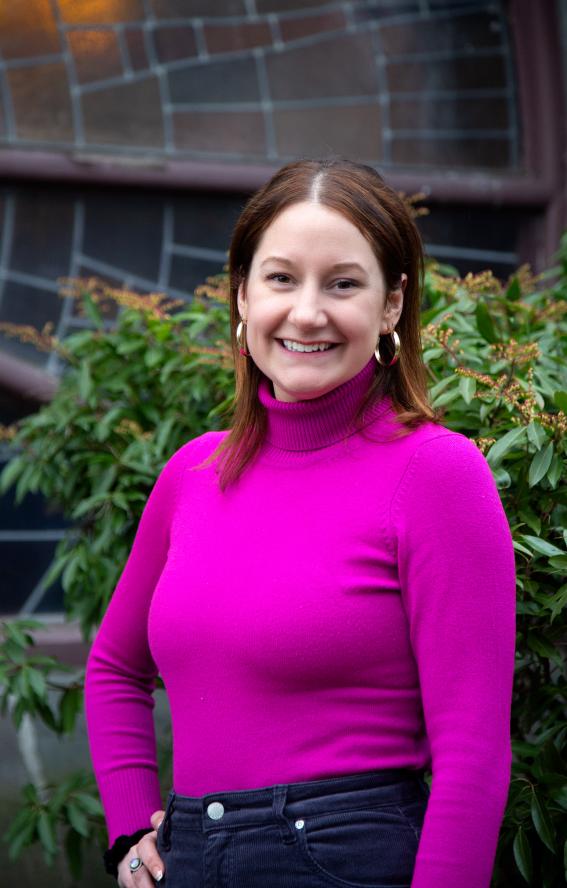Meet Heather Gilbert

By: Maisie O'Brien
“Occupational therapists can be incredible leaders,” says Heather Gilbert, a new lecturer in the Tufts Occupational Therapy Department. "Given our training in assessing our clients’ strengths and barriers in order to provide individualized support that promotes their ability to accomplish tasks, we are also skilled at determining ways to help our team members to shine. Many of us are natural problem solvers, great at strategizing around change, and focused on the collective good. I feel very strongly that all of the traits that make OTs successful with our clients make us successful leaders in higher levels of an organization."
Gilbert has held a series of management positions throughout her career, working primarily with populations experiencing mental health challenges and acquired brain injury. She was also the director of rehabilitation at an inpatient forensic psychiatric facility for men who were detained or incarcerated, operated by the Massachusetts Department of Corrections.
At Tufts, Gilbert is teaching a course entitled Occupational Therapy Practice in Psychosocial Dysfunction. “In my course we explore different mental health conditions and how to treat them, meaning how do we help our clients to do the things they want and need to do despite the condition that they are living with” she explains.
“But at the same time, we try to throw out the diagnostic labels a little bit and focus on the whole person in front of us. I encourage my students to consider their clients holistically and ask questions like: What are my client’s motivations? What activities are meaningful to them? What are their symptoms? How do we incrementally support them to have a better quality of life? As OTs we spend a lot of time meeting people where they’re at, while inspiring hope and resiliency.”
Gilbert subscribes to a biopsychosocial model of health, which emphasizes the interconnection between a client’s physical and mental health and the socio-environmental factors impacting their life. “I love this lens on health and treatment because it can encompass so many things,” she says. “For some clients, this means working on their emotional regulation, so they can have better quality interpersonal relationships. For others, it might involve helping them develop better coping skills, self-care, or medication management. For clients who are severely depressed, it might involve helping them to participate in anything meaningful at all.”
Gilbert found her time working with men who were detained or incarcerated to be particularly rewarding. She worked one-on-one with them, supervised staff members, and led groups focused on goal setting, emotional regulation, independent living skills, creative expression, and therapeutic activities, such as deep breathing, tapping, or movement-based activities like yoga and stretching.
“Many of the men had long histories of trauma and were carrying around a lot of shame,” she says. “Part of my job was to help them understand the mind-body connection and how their negative life experiences may have impacted their neurophysiology, how they regulate their emotions, and react to external circumstances. Once I was able to explain some of the brain science to them, I’d see a weight come off their shoulders and they’d understand that some of the challenges they’re experiencing aren’t necessarily their fault. And then we’d discuss neuroplasticity and how the brain can build new pathways and new ways of thinking, and that symptoms can improve and even go away over time.”
Gilbert is at once a faculty member, current doctoral student, and alum of the Tufts Occupational Therapy Department, and she credits her time here with preparing her to work in a variety of challenging settings. She is currently finishing a doctoral research project exploring how the field can better support OTs in obtaining community-based leadership positions.
“I love the Tufts program,”Gilbert says. “The faculty are incredible - they’re talented, compassionate, and creative, and we all work really well together. It’s a nice team feeling, which I think trickles down to the students who are also wonderful. My students ask such thoughtful, reflective questions. The OT Department really prepares its graduates to navigate the real world, be brave, and take risks when appropriate. My students want to be changemakers and it’s so exciting to see them grow as OT practitioners.”
When she isn’t working or teaching, Gilbert enjoys cooking, reading, and spending time with her family, including her husband and two young children.